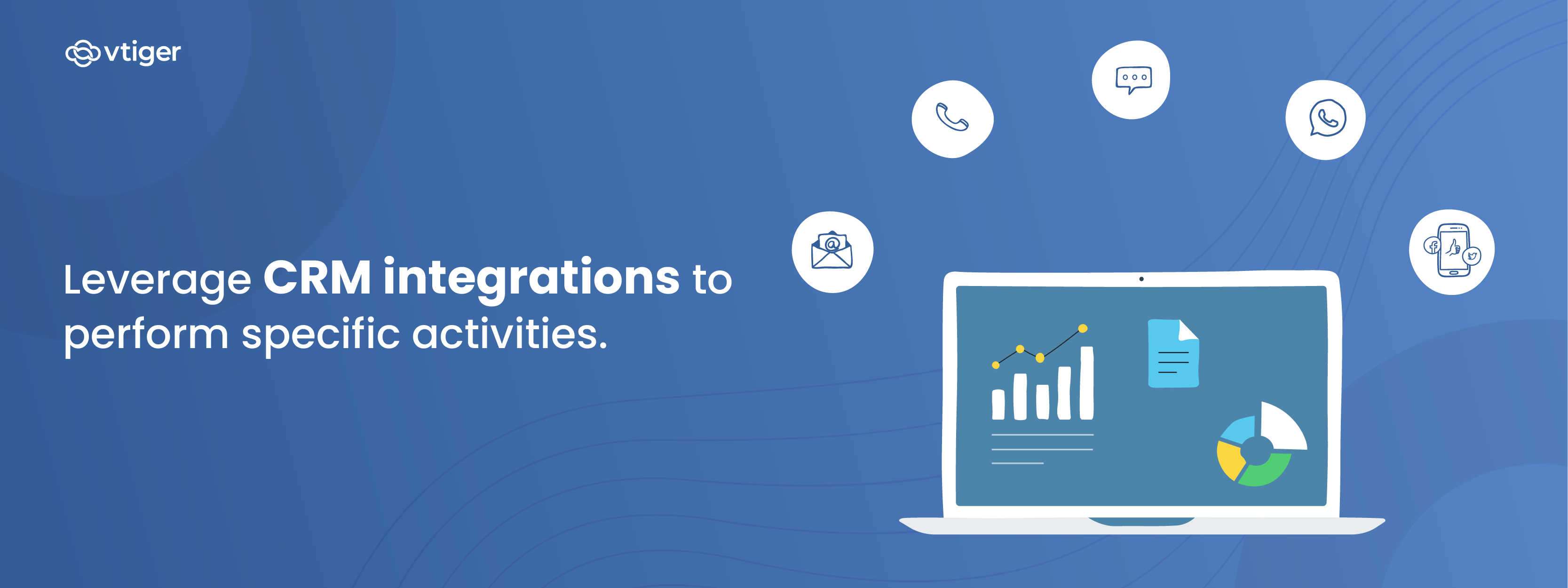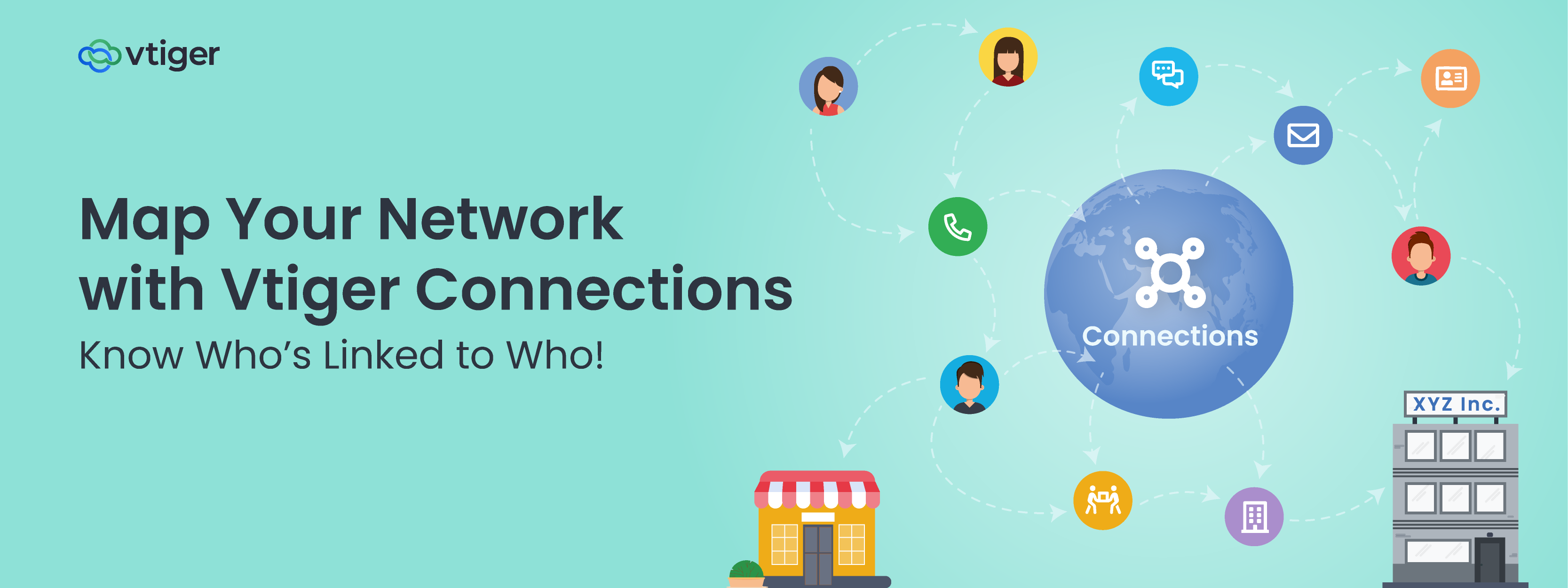Welcome back to the Cut-down Costs with CRM blog series where we will be discussing multiple dimensions of cost reduction with the help of a CRM.
In this blog, we will be discussing how third-party integrations in a CRM allows you to conduct business smoothly.
Do you use multiple applications including a CRM to run your business?
You may have implemented a robust CRM to execute your sales, marketing, and customer support activities. If you are using a CRM and other apps, it might be difficult to switch between multiple applications to complete your tasks. You might also not get unified data about your customer leading to departmental silos.
A lack of a ‘single source of truth’ about a customer leads to confusion, data duplication, and errors. There will be a significant decrease in efficiency and productivity.
Fortunately, most CRMs provide robust integrations with third-party applications.
What are CRM integrations
CRM integrations help you in connecting different applications to the CRM and allow for seamless dataflow between the CRM and apps. As mentioned above, one of the advantages of integrations is to provide accurate information about the customers, thus minimizing errors or data duplication.
As CRM allows you to record 360-degree customer information, integrating with different applications helps you in synchronizing and consolidating important data on a single platform.
As per a Deloitte article, third-party integration resources can help businesses in personalizing marketing offers, anticipating shifts in demand for products and services, etc. When you have dedicated applications to perform various activities on a single platform, you can streamline your work process effectively and facilitate better communication with your customers.
Now, let us understand the different types of external applications you can integrate into a CRM.
Different types of CRM integrations

While most CRMs come with primary offerings like contact management, deal management, customer support, etc., they may still not provide features for accounting, email, telephony or digital signatures. This is the reason companies rely on different apps along with a CRM to conduct their business.
Let us take a look at the most commonly used apps that are integrated with CRMs.
For communication:
You might be using different channels to collaborate with your customers effectively like emails, SMSes, calendars, etc. A CRM helps you connect with different service providers to perform these activities directly from the CRM. For example, a sales rep can make a call directly from the CRM instead of using mobile phones to reach out to a customer.
For accounting and billing:
You might be using Sage Accounting or Tally to manage your accounting activities. CRMs integrate stock items, ledgers, chart of accounts, etc., in the apps and help you with tracking expenses, invoicing, and more.
You can implement applications to reduce repetitive manual data entry for all transactions made between you and your customers. Sage Integration helps you in tracking expenses, invoicing, etc. Tally Integration allows you to integrate stock items, ledgers, etc., of an organization.
For social media collaboration:
Handling different social media profiles is a task in itself. Say if you want to post something on your Facebook, Linkedin, or Twitter profiles. Instead of visiting each and every account separately, you can share your posts in all your accounts from the CRM directly. Not just that, you can monitor messages, interact with your audience, gain valuable insights about your social audience, all from a single location.
For example, with WhatsApp Integration, you can send and receive messages directly from the CRM, use customizable templates for sending messages, set up alerts or notifications, etc. Facebook Integration allows you to capture leads, run multiple campaigns, etc.
Vtiger has integrated more than 500 different applications. Some of them are:
- Telephony Integration like Twilio, Plivio, etc., to manage your calls, SMS, etc.
- Accounting Integration like MYOB, Sage, etc., to track and manage invoices and billings processes.
- Email Integration like Zapier, Gmail, etc., to track and manage emails.
- Meetings Integration like MS Teams, Google Meet, Webx, etc., to make audio or video calls and streamline business meetings.
Benefits of CRM integrations
There are several benefits of third-party integrations in CRM. Let us discuss them below:
Seamless flow of data
CRM uses data mapping to record information. It captures valuable information from different applications and allows the data to flow seamlessly to and from the CRM. For example, if you have recorded customer information in accounting software, same data will be stored in the CRM which helps in reducing data duplication or errors.
Centralized data
When you integrate multiple apps with a CRM, you centralize all your customer data on a single platform without having to toggle between different applications. For instance, if a customer support team wants to know about the status of an issue raised by a customer, he can check the conversation history provided by various telephony applications and cross-check if the issue has been resolved or not.
This way your teams across the organization will be able to access the same information with ease.
Improved communication
Integrations with communication apps allow you to make calls, and send SMSes, emails, or WhatsApp messages directly from the CRM. You can also record information about customer engagement in the customer records. This information helps you streamline your communication and provide a superior customer experience.
Automate workflows
CRMs allow you to set up workflows for different tasks and help your team in improving productivity. You can also set up workflows for integrations thereby automating routine and time consuming tasks. For example, you can send a series of emails to your customers with new offers, record deal-related information from incoming emails, etc. This aids you in saving time and focus on other high-priority tasks.
So, by integrating different apps in the CRM, you will not have to invest on standalone software to perform specific functions which helps you in overall cost reduction
If you would like to see how Vtiger integrates seamlessly with third-party apps,
Click here to sign up for a 15-day free trial or try our forever free Pilot edition.
———————————————————-
Click the below links to read our blogs in this series



